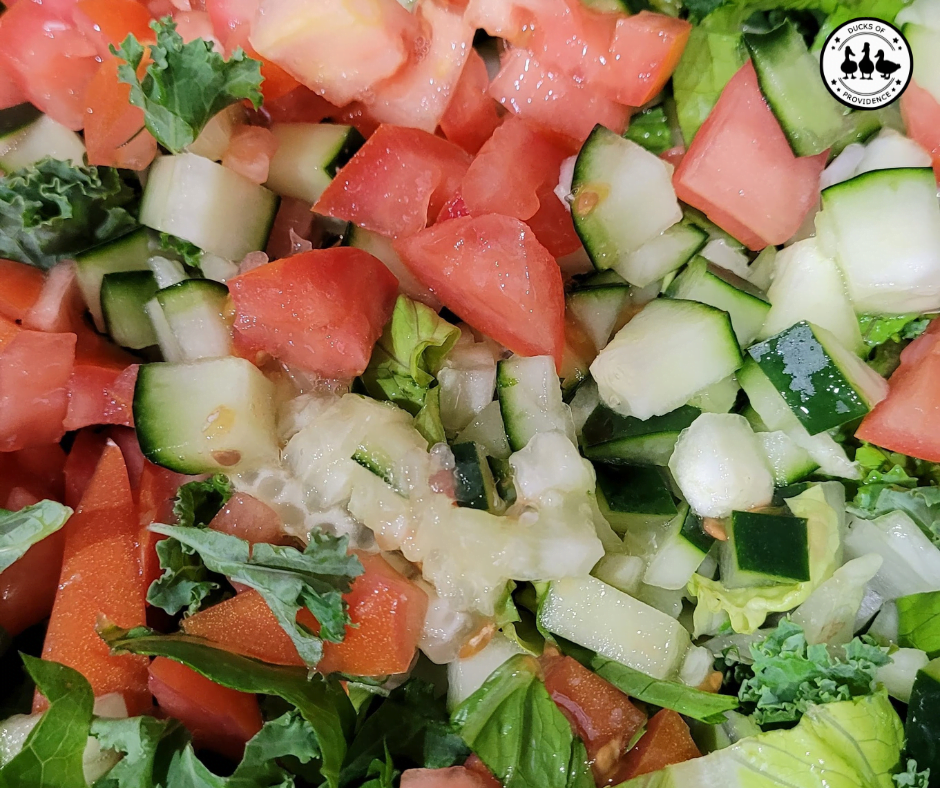
What do Pet Ducks Eat? A Guide to a Healthy and Nutritious Pet Duck Diet
Last updated on January 15th, 2026 at 02:19 pm
Welcome to our comprehensive guide on healthy and nutritious pet duck food. Whether you’re a new duck owner or looking for ways to improve your feathered friend’s diet, you’ve come to the right place if you want to learn what pet ducks eat.
At Ducks of Providence, we understand that providing the best nutrition for your pet duck is essential for their overall health and well-being. That’s why we’ve put together this informative guide to help you make informed decisions about their diet.
Ducks have specific dietary needs that differ from other domesticated pets, and it’s important to meet those requirements to ensure they thrive in captivity. From proteins and grains to important vitamins and minerals, we’ll cover everything you need to know about providing a balanced and nutritious diet for your duck.
In this article, we’ll explore the different types of food that ducks can eat, including commercial duck feed and fresh produce. We’ll also discuss portion sizes, feeding schedules, and potential food hazards you should be aware of.
Plus, I’ve included handy infographics for easy reference, making it simple to understand and implement proper duck nutrition.
So, let’s explore the best food options to keep your duck happy, healthy, and quacking with delight.
As an alternative, you may want to watch our YouTube Video instead to learn more about healthy pet duck food:
Ducks of Providence is free, thanks to reader support! Ads and affiliate links help us cover costs—if you shop through our links, we may earn a small commission at no extra cost to you. Thanks for helping keep our content free and our ducks happy! 🦆 Learn more
The Importance of Proper Nutrition for Pet Ducks
Proper nutrition is crucial for the health and well-being of pet ducks. A well-balanced diet provides the necessary nutrients for their growth and development and helps prevent various health issues.
Ducks require a diet high in protein, vitamins, and minerals while low in fat. This ensures that they have enough energy to thrive without becoming overweight, which can lead to health problems such as liver disease or heart issues.
In addition, a nutritious diet plays a vital role in maintaining a strong immune system, which helps ducks fight off diseases and infections. By providing your duck with the right nutrients, you can help them lead a long and healthy life.
➡️ Read more: Essential Nutritional Needs of Ducks: A Complete Overview
Crucial Insights into Duck Nutrition
Understanding Wild Ducks Feeding Behavior First
To begin with, ducks are omnivores, which means they eat plants and animals. Hence, their diet should contain various foods that give them the necessary nutrients.
Wild ducks’ diets mainly consist of aquatic plants, such as algae, pond weeds, and water lilies. They also eat insects, worms, small fish, and shellfish. In the winter, when food is limited, ducks sometimes eat grains, berries, and nuts.

Ducks have many adaptations that help them to find and eat food. Their long necks allow them to reach underwater food, while their webbed feet help them swim and paddle through the mud when looking for food. Additionally, their bills are specially designed to filter out small pieces of food from the water.
Furthermore, ducks are very important for the environment. They help control populations of insects and small fish, and they also help spread seeds and aerate the soil.
On the other hand, domestic ducks depend on humans for food and shelter since they usually don’t have the instinct to migrate or find food independently. Therefore, providing domestic ducks with a proper and balanced diet is essential.
The Importance of a Balanced Diet
A balanced diet is essential for the overall health and well-being of your pet duck. Just like humans, ducks require a variety of nutrients to function properly. These nutrients include proteins, carbohydrates, fats, vitamins, and minerals. A lack of these nutrients can lead to various health issues and even shorten your duck’s lifespan.
The Role of Proteins
Protein is an essential component of a duck’s diet. It plays a crucial role in the growth, repair, and maintenance of body tissues. Ducks require a higher protein intake than other poultry birds due to their active lifestyle. Good sources of protein for ducks include commercial duck feed, insects, worms, and small fish. It’s important to provide a variety of protein sources to ensure your duck gets all the essential amino acids it needs.
The Importance of Carbohydrates
Carbohydrates are an important source of energy for ducks. They provide the fuel needed for daily activities, including swimming and foraging. While ducks can obtain carbohydrates from commercial feed, they also enjoy consuming grains and seeds. Some popular carbohydrate sources for ducks include cracked corn, oats, wheat, and barley. It’s important to note that while grains are a good source of energy, they should be fed in moderation to prevent obesity.
Choosing the Right Commercial Duck Feed
When selecting commercial duck feed, choosing a high-quality brand with a balanced blend of proteins, carbohydrates, vitamins, and minerals is important. Look for feed formulated explicitly for ducks rather than generic poultry feed. Read the label carefully to ensure it meets the nutritional requirements of ducks at different life stages.
➡️ Read more: Commercial Duck Feed Comparison
Feeding Commercial Duck Feed
Commercial duck feed should make up a significant portion of your duck’s diet. Provide the feed in a clean and dry feeder, ensuring it is accessible to your duck at all times. Ducks have a habit of splashing water into their feed, so monitoring and replacing wet feed regularly is essential. The quantity of feed will depend on your duck’s age, size, and activity level. Always follow the feeding guidelines provided by the manufacturer and adjust the amount according to your duck’s needs.
➡️ Read more: Feeding Ducks: A Guide to Keeping Your Flock Happy and Healthy
Supplementing with Fresh Produce
While commercial duck feed is nutritionally complete, it is still beneficial to supplement your duck’s diet with fresh produce. Fresh fruits and vegetables provide additional vitamins and minerals that may be lacking in processed feed. Ducks enjoy a wide range of produce, including leafy greens, carrots, peas, and berries. However, it’s important to introduce new foods gradually to avoid digestive upset.
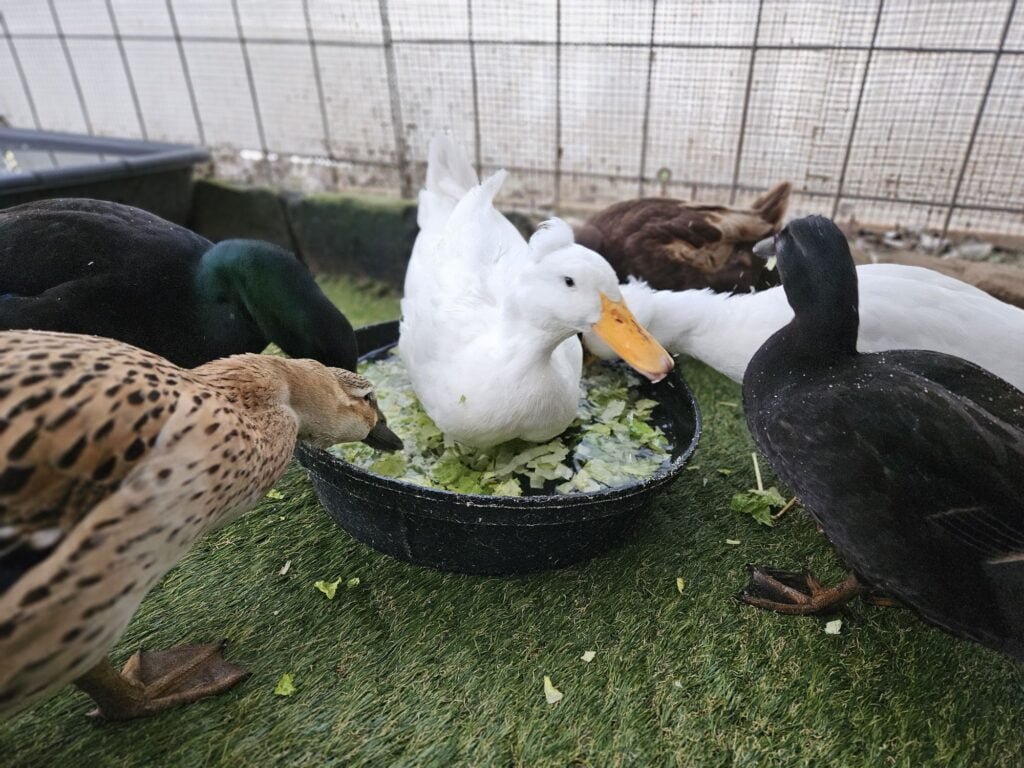
Foods to Avoid
Certain foods should be strictly avoided when feeding your duck. These include chocolate, caffeine, alcohol, avocados, onions, garlic, and mushrooms. These foods can cause various health issues, ranging from digestive upset to organ failure. Additionally, avoid feeding your duck foods high in salt, sugar, or artificial additives, as these can be detrimental to their health.
Toxic Plants and Substances
In addition to specific foods, it’s important to be aware of toxic plants and substances that can harm your duck. Some common plants that are toxic to ducks include azaleas, lilies, daffodils, and rhododendrons. These plants can cause symptoms ranging from digestive upset to organ failure. Additionally, certain household substances like cleaning products, pesticides, and rodenticides can be toxic to ducks. Always ensure your duck’s environment is free from potential hazards.
Consulting with a Veterinarian
If you’re unsure about the safety of a particular food or have concerns about your duck’s diet, it’s always best to consult with a veterinarian. A veterinarian with experience in avian medicine will be able to provide personalized advice and ensure your duck’s diet meets their specific needs.
Common Misconceptions about Duck Food
Several common misconceptions exist about what ducks can and cannot eat. Dispelling these misconceptions is important to ensure that your duck receives a healthy and nutritious diet.
One common misconception is that ducks can eat bread. While ducks may enjoy bread, it is not suitable for them. Bread offers little nutritional value and can lead to malnutrition if it becomes a significant part of their diet. Instead of bread, provide your duck with foods that are rich in nutrients and specifically formulated for their dietary needs.
Another misconception is that ducks can eat just about anything. While ducks have a more varied diet than some other pets, it is important to provide them with foods that are safe and beneficial for their health. Avoid feeding ducks foods high in salt, sugar, or fat, as these can harm their well-being.
Feeding Guidelines and Portion Control for Ducks
Establishing a feeding routine and practicing portion control is essential for maintaining a healthy weight and preventing overeating in ducks. Ducks are opportunistic eaters and will continue to eat if food is readily available, which can lead to obesity and related health issues.
When it comes to portion control, it is important to offer your duck an appropriate amount of food based on their size, age, and activity level. Follow the guidelines provided on the commercial duck feed packaging, as they are often formulated to provide the necessary nutrients in the correct proportions.
In addition to commercial feed, ducks should always have access to fresh water. Ducks use water to help digest their food, so it is important to ensure they have clean water for drinking and bathing.
Choosing the Right Commercial Duck Feed for Pet Ducks
When selecting commercial duck feed, choosing a high-quality brand with a balanced blend of proteins, carbohydrates, vitamins, and minerals is important. Look for feed formulated explicitly for ducks rather than generic poultry feed. Read the label carefully to ensure it meets the nutritional requirements of ducks at different life stages.
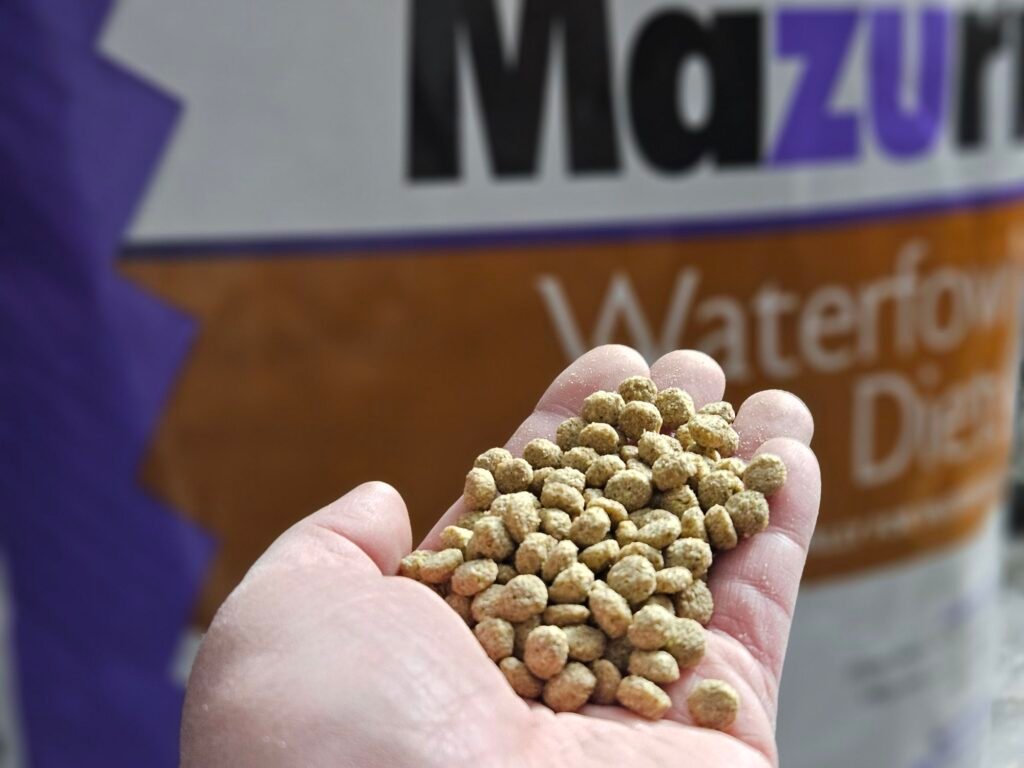
Commercial Duck food usually comes in the form of pellets or crumbles. You can find it at most farm supply stores or online. There are different brands, but please make sure to get duck food, not chicken or other poultry feed. We used Purina Duck Pellets or Mazuri Waterfowl Maintenance Diet for Ducks and Geese.
Ducks have different nutritional needs. They need much higher amounts of niacin than other birds. They also need the right amount of protein. Protein is essential for building and maintaining muscle mass. This is why adult ducks should be fed maintenance food with about 15-16% protein. Ducklings need different amounts of protein, though. Read more about that in our post on how to raise ducklings.
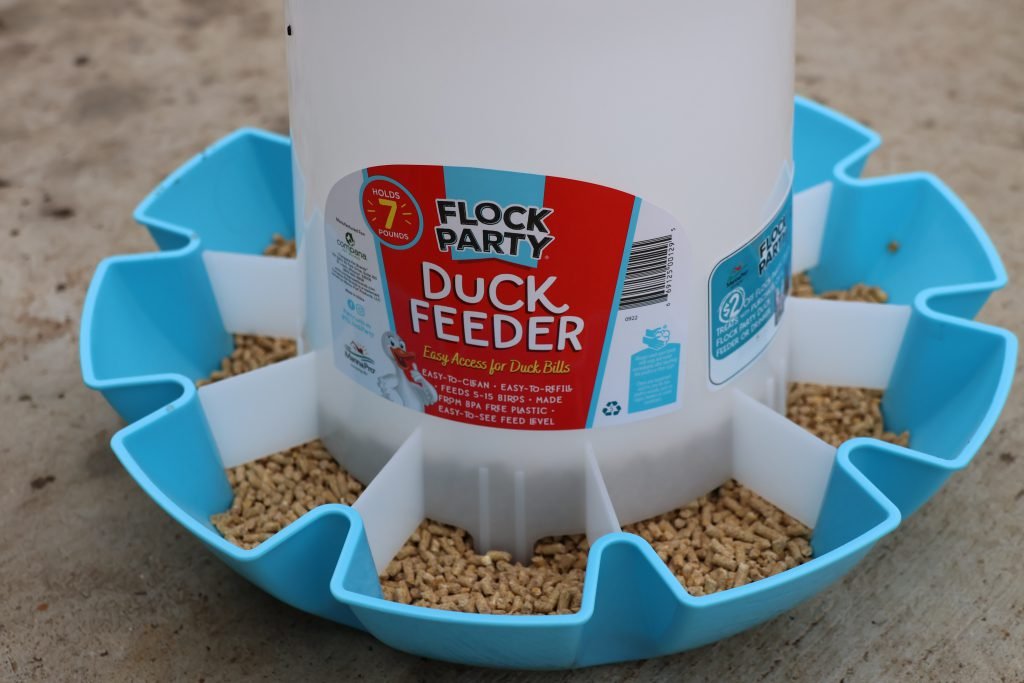
Furthermore, duck food should also contain enough calcium for strong bones and eggshells. You could also choose to give your ducks layer food that is higher in calcium, but this might be problematic if you have ducks in your flock that do not lay eggs because they are too young or too old. Or when you have drakes in your flock. They have different needs. Too much calcium can be problematic for drakes, and it can cause problems with their kidneys. Give your duck oyster shells for calcium instead as a free choice. The ducks will know when they need it and only eat as much as they need. Their bodies will tell them.
Fresh Vegetables are an Important Part of a Ducks Diet
Ducks love vegetables, which are a good source of vitamins, minerals, and fiber. Some good options are carrots, peas, corn, cucumber, kale, lettuce, bell pepper, cabbage, pumpkin, and squash. This is why vegetables should be part of regular pet duck food.
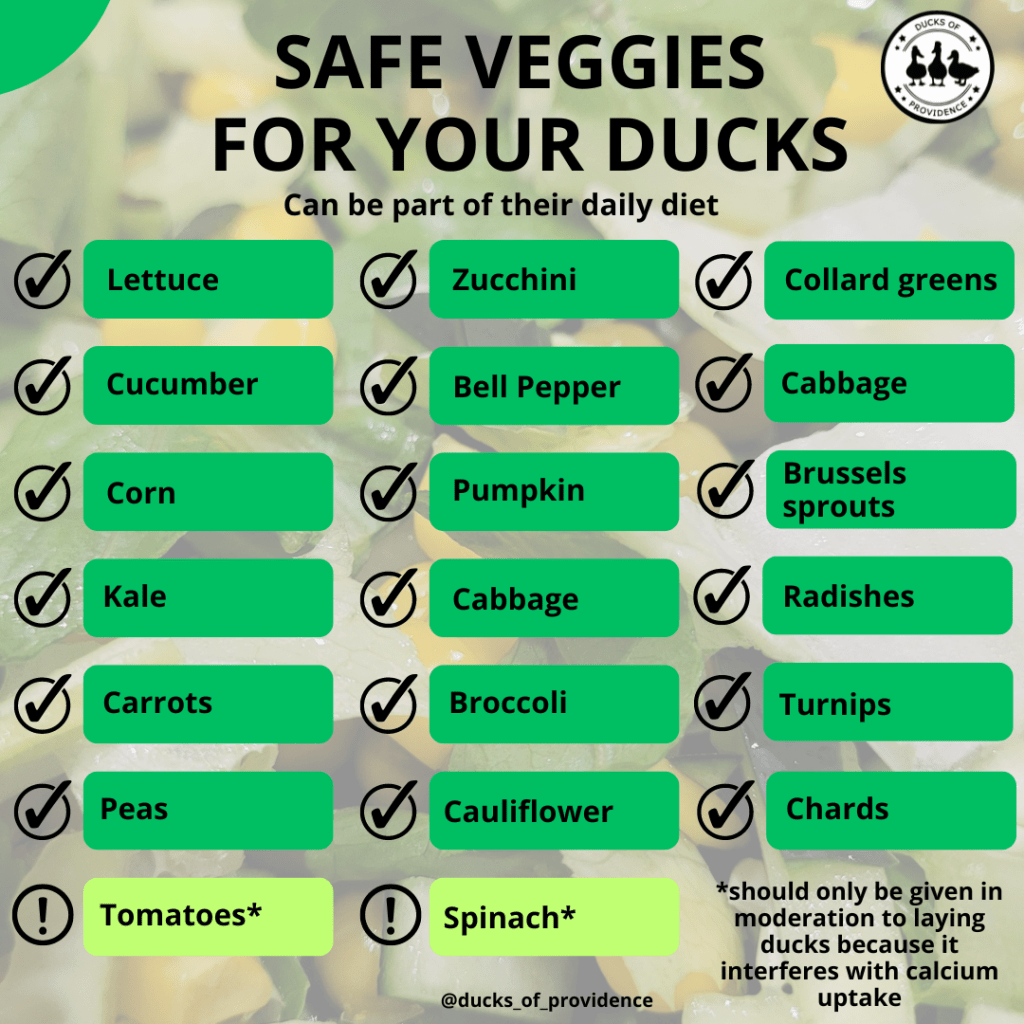
When feeding vegetables to ducks, chop them into small pieces so they can easily eat them. You can add vegetables to your duck’s water to make a refreshing and nutritious drink. That will also help them to swallow it without choking.
Fresh Fruits are a Nice Treat.
Ducks also enjoy fruits, but they should only be given in moderation. Because fruits are high in sugar, overeating them can lead to weight gain and other health problems in ducks. Some good fruits to feed ducks in moderation include strawberries, blueberries, bananas, watermelon, or grapes. You can also provide your ducks with apples, but only if the apple’s seeds and core are removed. Apples are a great source of antioxidants and many minerals.
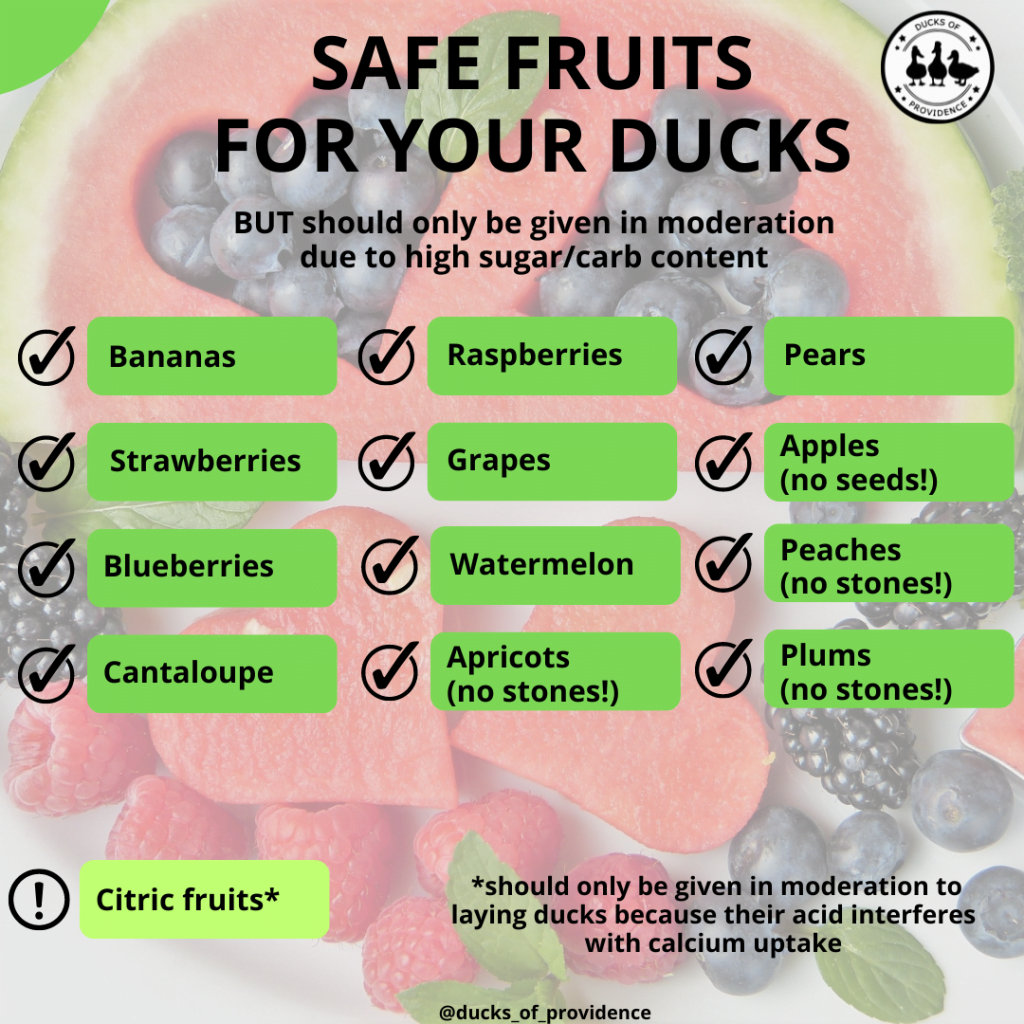
Food that Should ONLY be Fed in Moderation to your Pet Duck
Spinach (and other foods containing oxalic acid) interferes with calcium absorption and can cause egg binding or soft-shelled eggs. So, while highly nutritious, spinach should be fed only in limited amounts. The same is true for tomatoes and citrus fruits. Due to their acidity, they also interfere with calcium uptake.
Iceberg lettuce has very little nutritional value and can cause diarrhea in large amounts.
Pet Duck Food Delights: Insects are a Good Source of Protein
Ducks will eat insects, such as worms, flies, and mosquitoes. This is a great way to help them control pests in your yard. Insects are a good source of protein and other nutrients for ducks. Some good insects to feed ducks include crickets, grasshoppers, and beetles. Worms are also good sources of protein and other nutrients for ducks. Some good worms to feed ducks include earthworms, mealworms, or grubs.

Black Soldier Fly Larvae
Grubs, aka BSL (black soldier fly larvae), are rich in proteins and fats and boast significantly higher calcium content than mealworms. They serve as a natural powerhouse for ducks. They promote optimal health and vibrant plumage, making them an essential treat for our feathered friends to thrive happily! We’re excited to offer you an exclusive discount on Grub Terra Products. Simply use code Providence10 to save 10% on your first order with Grub Terra (the discount also works for their other products).
Fish and Shellfish
Ducks will eat small fish if they can find them. Small fish are a good source of protein and other nutrients. You can get freeze-dried ones from Flock Party, living minnows, or guppies from a pet store.

Grains Suitable As Pet Duck Food
Ducks can eat grains like corn, oats, wheat, and barley. However, these should be fed in moderation, as they can be high in calories.
Rice and pasta can also be given when cooked, but only in moderation for the same reasons.

Water is essential for Ducks
Ducks need access to fresh, clean water at all times. They should have a bowl of water that is large enough for them to dip their heads into.
It is important to note that ducks have a very sensitive digestive system. If they eat the wrong thing, it can make them very sick. So, it’s important only to feed them food that is safe for them to eat. Some of these foods include:
Fruit and Veggies Toxic for Ducks
Ducks should avoid eating Nightshade vegetables because all parts of these plants (stock, leaves, stems, and fruit) are toxic to ducks.
White potatoes are part of the nightshade family and should be avoided, along with other family members, including rhubarb, green tomatoes, and eggplant.
Raw, dried beans can be toxic, so beans should only be fed fresh or sprouted to your ducks.
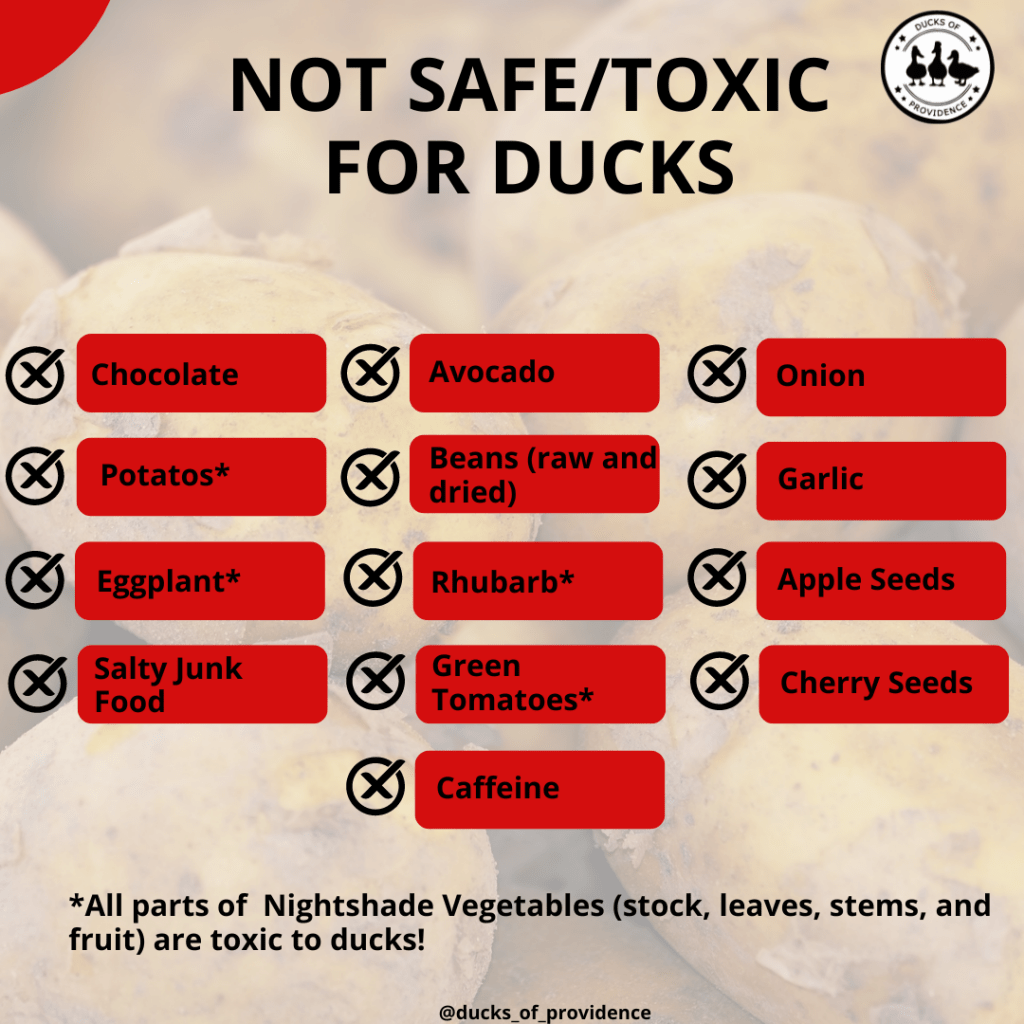
Bread: Bread is not a good food for ducks. It is high in carbohydrates and low in nutrients. Bread, chips, crackers, donuts, cereal, popcorn, and similar bread-type products and scraps are never best to feed birds. Overeating bread can lead to obesity and other health problems.
Chocolate: Chocolate is toxic to ducks. It contains theobromine and caffeine, which can cause vomiting, diarrhea, seizures, and even death.
Avocado: Avocados contain a substance called persin, which is toxic to ducks. Eating avocados can cause vomiting, diarrhea, and even death.
Onions: Onions contain a substance called N-propyl disulfide, which can damage red blood cells in ducks. Eating onions can lead to anemia and other health problems.
Garlic: Garlic contains allicin, which can damage ducks’ red blood cells. Eating garlic can lead to anemia and other health problems.
Salty foods: Salty foods can dehydrate ducks and lead to kidney problems.
Sugary foods: Sugary foods can make ducks overweight and lead to health problems.
What Else is Important for a Healthy Pet Duck Diet?
Ducks need a constant supply of fresh water. They should always have access to a clean water source, especially during hot weather.
Ducks also need access to grit, a mixture of small stones and sand. Grit helps to grind up food in their stomachs and aids in digestion.
Oyster shells for ducks as a free choice. It provides your ducks with calcium that helps build strong egg shells. Calcium will be taken from their bones when they don’t get enough through their food. This will make them weak over time.
➡️ Read more: Ducks and Water: Keeping Your Flock Happy and Healthy
Oyster Shells
Calcium plays a vital role in developing and maintaining strong bones and eggshells in ducks. As a valued Ducks of Providence community member, we’re excited to offer you an exclusive discount on Scratch and Peck Oyster Shells. Simply use code providence15 to save 15% on your first order with Scratch and Peck (the discount works for their other products as well).
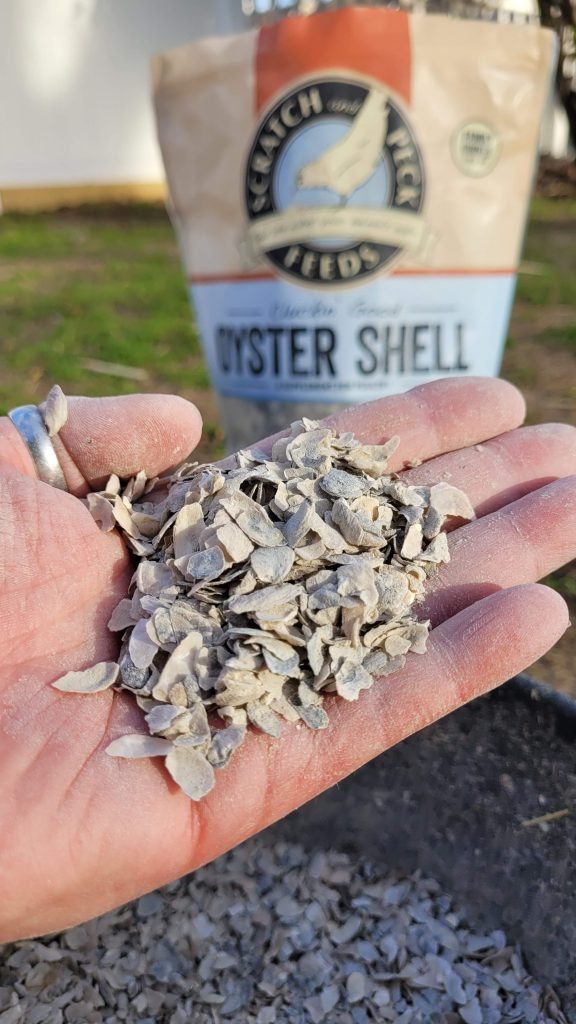
Ducks should be fed at least twice a day, but they may need to be provided more often if they are very active or the weather is hot.
It is important to avoid feeding ducks too much food, as this can lead to obesity and other health problems.
It is also important to avoid feeding ducks spoiled or rotten food. This can make them sick.

If you are unsure about whether a food is safe for ducks to eat, it is best to err on the side of caution and avoid feeding it to them. You can also consult with a veterinarian or a qualified poultry expert.
Conclusion
Feeding proper pet duck food is vital to your feathered friend’s health and well-being. Following the tips in this post, you can help ensure your ducks get all the nutrients they need to live long and happy lives. If you want to dive deeper into duck nutrition, I invite you to read our post titled Essential Nutritional Needs of Ducks: A Complete Overview.
I’m curious to know what you feed your ducks. What is their favorite food? Let us know in the comments below!
